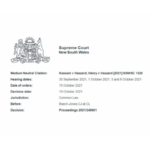Vaccination Mandates Must Be ‘Fair and Reasonable’

The full bench of the Fair Work Commission (FWC) has found that a decision by mining company BHP to make Covid-19 vaccinations at the Mt Arthur mine in the Hunter Valley compulsory for workers was not lawful or reasonable.
About 50 workers at the coal mine were stood down, reportedly without pay, when they were unable to provide evidence of their vaccination status.
A ‘win’ for the rights of workers
Last week, the FWC ruled that the company direction was not covered by the mine’s enterprise agreement for workers, and that BHP mishandled the consultation process with workers when it attempted to introduce the vaccination mandate.
Last year the FWC set down guidelines for employers wanting to introduce vaccine mandates as a condition of employment. Most specifically, it recommended that any such directions needed to be lawful and reasonable.
As employment lawyers have pointed out, whether a direction is fair and reasonable, is dependent on a number of factors, including, but not limited to considerations such as:
- Whether a specific law or industry provision requires vaccinations for certain reasons, the nature of a person’s role
- Whether there are options available for a direction to be met by alternative means such as regular testing, social distancing, remote work options.
- Whether an enterprise agreement or employment contract contains vaccination provisions or other clauses which may impact a direction and, if so, the nature and applicability of those provisions to the present situation.
The Mt Arthur mine workers argued that the mandate given by BHP was unlawful because it did not comply with consultation requirements in their employment agreement.
The workers were represented via the Construction, Forestry, Mining and Energy Union (CFMEU) which spearheaded the legal action in the Fair Work Commission.
‘Arrogant’ BHP
The CFMEU has described the outcome as a ”win for the rights of workers to be genuinely consulted” and slammed BHP as “arrogant” in the way it went about imposing the mandate which did not have the backing of a public health order.
BHP told the FWC it sought feedback from staff via company emails sent to employees. However workers said there had been issues around accessing company emails. BHP’s representative also admitted that communication issued three days before the October 7 announcement did not include the word “mandatory”.
The CFMEU has always taken the stance that it would encourage its members to be vaccinated, but that it was not in favour of rules that meant “no job, no jab.”
The FWC ruling does leave the door open for the CFMEU to engage in further consultation with BHP.
BHP has said it is “assessing the implications of the decision”.
‘Seminal Case’
It’s the first case of its kind to be rejected by the FWC in New South Wales. Previous challenges to mandates, or cases of unfair dismissal as a result of refusal to comply with vaccination policies have failed. Although it should be noted that previous cases were in industries (childcare and aged care) where the nature of the work means the potential for transmission of Covid-19 is deemed to be high risk.
For this reason, the BHP case is considered a “seminal case” because of its potential implications for other workplace vaccination mandates.
Employment lawyers are taking note of the case because it provides more clarity around the minimum expectations required in terms of consultation with employees, the ‘reasonableness’ of a vaccination mandate and the rollout.
To be clear, this is not a ruling that opposes workplace vaccination mandates. In fact, it does the opposite by endorsing them. The message from the FWC is that employers can introduce workplace vaccination mandates, however in doing so they need to follow due process and an open dialogue with employees.







